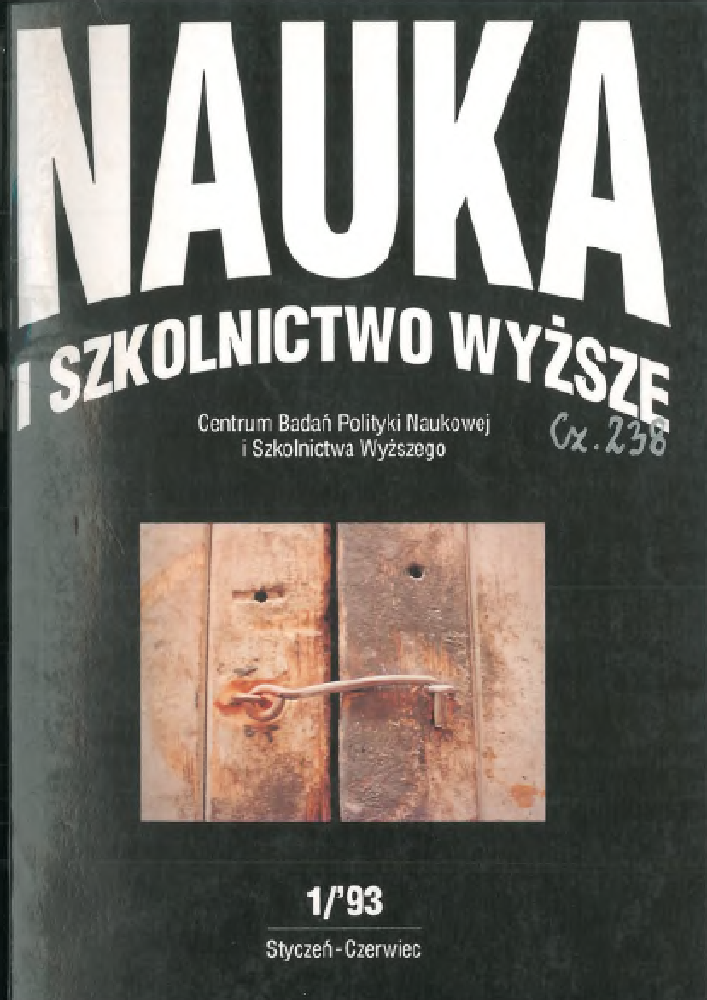Abstrakt
W artykule prezentowany jest szeroko dyskutowany w Europie Zachodniej i w USA problem jakości szkolnictwa wyższego. Analizowane są przyczyny, które w latach osiemdziesiątych spowodowały wzrost zainteresowania zarówno doskonaleniem, jak i pomiarem jakości procesów dydaktycznych i pozadydaktycznych zachodzących w instytucjach szkolnictwa wyższego. Autorka omawia zmieniającą się rolę państwa w zarządzaniu systemem szkolnictwa wyższego w krajach EWG. Twierdzi ona, że zachodzące zmiany w sterowaniu szkolnictwem wyższym są odbiciem tendencji politycznych i społecznych. Prezentuje mechanizmy doskonalenia jakości w instytucjach szkolnictwa wyższego, a w tym - dość szczegółowo - jeden z modeli zarządzania przeniesiony ze świata biznesu do szkolnictwa ponadśredniego, tj. TQM (Total Quality Management). Najwięcej miejsca w artykule zajmuje analiza mechanizmów i procedur oszacowywania jakości w instytucjach szkolnictwa wyższego. Autorka omawia dwa przeciwstawne modele kontroli jakości, tj. poprzez autorytety zewnętrzne i poprzez społeczność akademicką. W ramach tego rozróżnienia autorka omawia, m.in., mechanizm peer remem i mechanizm akredytacji.
Bibliografia
The Balance..., 1987 The Balance Wheel for Accreditation. Washington D.C.: Council on Postsecondary Accreditation (COPA).
Ball Ch. 1985 What the Hell is Quality? W: D. Urwin (red.): Fitness for Purpose. Guilgford: The Society for Research into Higher Education and NFER-Nelson.
Becher T. 1989 Academic Trihes and Territories, Intellectual Enquiry and the Cultures of Disciplines. Bristol: The Society for Research into Higher Education and the Open University Press.
Clark B.R. 1983 The Higher Education System. Berkeley: University of California Press.
Cobban A.B. 1975 The Medieoal Unmrsities: Their Development and Organisation. London: Methuen and Co.
Conrad C.F., Blackburn R.T. 1985 Program Quality in Higher Education. W: J.C. Smart (red.): Higher Education. Handbook ofTheoiy and Research. Vol. 1. New York: Agathon Press.
Cross-Durrant A. 1992 „Total Quality Management in Post-compulsory Education”. Referat wygłoszony na konferencji Fourth International Conference on Assessing Quality in Higher Education (Enschede w Holandii).
Goedegebuure L.C.J., Maassen P.A.M., Westerhejden D.F. (red.) 1990 Peer Review and Performance Indicator. Utrecht: Lemma.
Goedegebuure L.C.J., Kaiser F., Maassen P.A.M., Meek V.L., van Vught F.A., Weert E., de 1992 Higher Education Policy in International Comparatwe Perspectw. Enschede: Centre for Higher Education Policy Studies.
Kells H.R. 1988 Self-study Processes. A Guide fo r Postsecondary and Similar Senice-oriented Institutions and Programs. Wyd. III. New York: Macmillan.
Neave G., Vught F.A., van 1991 Prometheus Bornd. The Changing Relationship Between Government and Higher Education in Western Europe. (Mord: Pergamon Press.
Neave G. 1988 On the Cultivation of Quality. Efficiency and Enterprise: an Overview of Recent Trends in Higher Education in Western Europe, 1986-1988. „European Journal of Education” 23, nr. 1-2.
Pirsing R.A. 1974 Zen and the Art of Motorcycle Maintenance. New York: Morrow.
Vroeijenstijn A.L., Acherman H. 1990 Control Oriented versus Imprmment Oriented Quality Assessment. W: Goedegebuure, Maassen, Westerheijden 1990.
Vught F.A., van 1991 Higher education quality assessement in Europe. „Higher Education Policy Studies” 107.
Westerheijden D.F. 1991 Promises, Problems and Pitfalls of Peer Reniew. The Use of Peer Review in External Quality Assessement in Higher Education. Enschede: CHEPS.
Williams P.R. 1991 The CVCP Academic Audit Unit. Birmingham.
